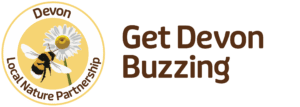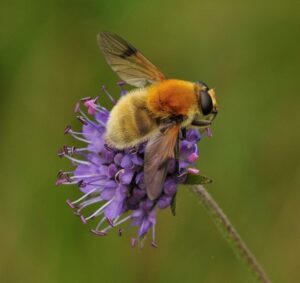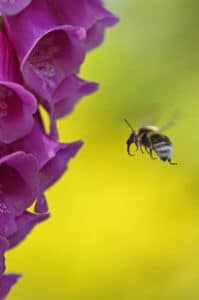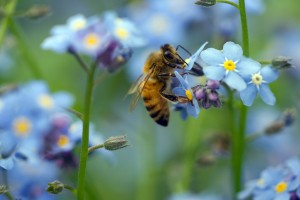Get Devon Buzzing is all about raising awareness of the importance of pollinators such as bees, wasps, hoverflies butterflies and moths and taking positive action to conserve them!
Between 75% and 95% of the Earth’s flowering plants require pollination including 1200 crop species. Devon is also home to some incredibly rare and threatened pollinators known as the Devon Special Species. Read on to find out what you can do to help our pollinators.
How can you help pollinators? Commit to making some positive actions to benefit pollinators across Devon. Check out our pollinator resources pages to find activities that are relevant to you, your business or work.
Check out our past events and competitions for more inspiration.
Partner projects
There are lots of projects that are helping Devon’s pollinators, from surveys of rare species, to managing nature reserves and creating new wildflower-rich habitats in the countryside and our urban areas. Here are some links to partnership projects that are currently taking place, or have occurred across the county:
Action for Insects – A campaign run by Devon Wildlife Trust providing guidance on how to help conserve our insects – including pollinators – and find alternatives for chemical pesticides. Sign up through to get a free hard copy guide.
Life on the Edge project – A National Lottery Heritage Fund project seeking to restore the habitats and raise awareness of threatened bee species found on the species-rich cliff grasslands between Wembury and Berry Head. It is a multi-partner project involving Buglife, South Devon AONB, The National Trust, Torbay Coast and Countryside Trust and Plantlife.
Torbay’s Buzzing – Buglife partnered with Torbay city council to tackle the declining populations of pollinators by managing public spaces and creating wildflower rich areas so that bees, butterflies and other pollinators can thrive.
Plymouth’s Buzzing! – In partnership with Plymouth City Council, Buglife has involved local schools and communities in conserving bees, butterflies, hoverflies and other pollinating insects at sites across the City.
Moor Meadows – Established in 2015 by a small group of local people in order to help each other conserve, restore and create flower-rich grasslands in the Dartmoor landscape.
West Country Buzz project – The Bumblebee Conservation Trust has been working alongside Natural England and other NGOs across Devon to develop this project, which aims to provide management advice and training to farmers who want to improve conditions for pollinators and other wildlife on their farm. The project also hopes to improve the survey effort for bumblebees in Devon by running workshops for people to increase our understanding of bumblebee distribution and abundance. Take a look at the project Flyer
South West Bees project – Buglife have been working with others to survey, monitor, map and conserve Devon’s most threatened bees.
South Devon B-Lines – The South Devon B-Lines Project is a partnership between Buglife and South Devon Area of Outstanding Natural Beauty (AONB), and is part of the wider B-Lines initiative, identifying and then developing a UK-wide network of wildflower-rich meadows and grasslands.
Pollinator Monitoring Scheme (PoMS) – Set up by the Centre for Ecology and Hydrology, the PoMS aims to improve our understanding of pollinator distribution by introducing surveys for the public to get involved in.
Life on the Verge project – Devon County Council is working with partners to produce guidance and case studies encouraging communities to manage road verges for wildlife.
Exeter Wild City project – This project is run by Devon Wildlife Trust and Exeter City Council and over the past few years has been transforming local green spaces into wildflower rich meadows, orchards and other pollinator-friendly schemes.
If you would like to help this campaign please contact naturalenvironment-mailbox@devon.gov.uk



